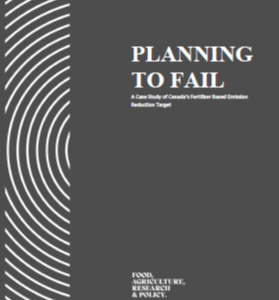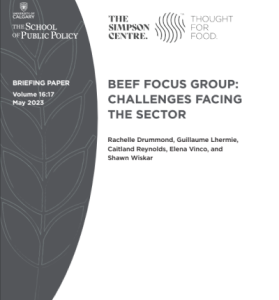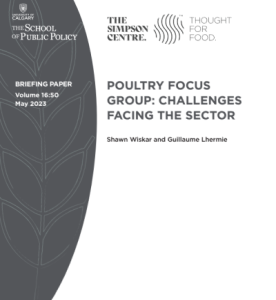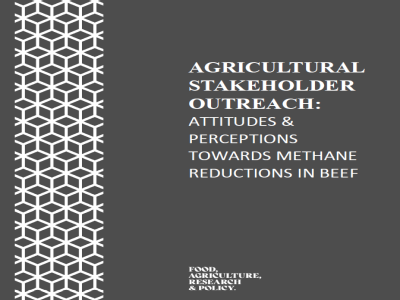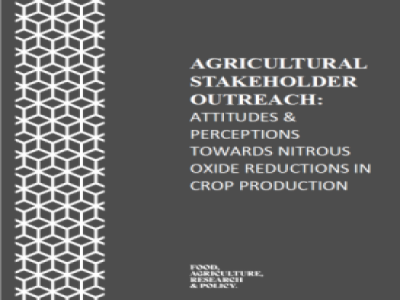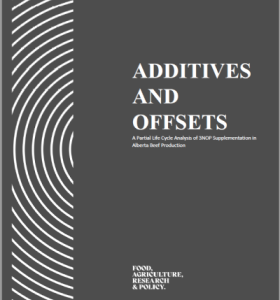Publications
Target setting is an important step in the development of public policy. Targets provides a clear indication of the government’s policy objectives and priorities. They also provide stakeholders clear policy direction, enabling them to plan, monitor, and deliver on policy objectives. To be effective targets need to be well-defined, measurable, and achievable. This report examines the Government of Canada’s fertilizer-based emission reduction target using the criteria for effective targets. This report conducts a review the targets announcement and consultation, Industry repose to the target, and the methodology used to monitor success. This report concludes that while the targets goals of improving efficiency and optimizing nitrogen use are laudable, the measurement use make meeting the target impossible without reductions in nitrogen fertilizer, an action strongly opposed by producers and counter to the targets goal. Lastly the report provides suggestions as to where the methodology could be improved and areas to priorities in the short and long terms to be able to effectively set emission-based targets for 2050.
Friday, July 07, 2023
Joshua Bourassa, Nataliia Arman, Hannan Ishaque, Guillaume Lhermie
The Simpson Centre ran a focus group in July 2022 to better understand how the Canadian
cattle industry is handling various challenges, how they interact with policy and their
short-term and long-term priorities. The focus group was made up of industry stakeholders
from various points throughout the supply chain. The discussions were recorded and then
analyzed and coded to determine the key points and develop policy recommendations.
Friday, May 26, 2023
Rachelle Drummond, Guillaume Lhermie, Caitland Reynolds, Elena Vinco, and Shawn Wiskar
The Canadian poultry industry is small but significant; chicken is the most consumed animal meat protein in the country, the consumption of which has increased with population growth and immigration from cultures that favour the meat over beef and pork. Meanwhile, the industry is under pressure to align with sustainability goals, specifically to reduce its greenhouse gas emissions. In 2021, to better understand the industry’s challenges and possible policy solutions to those challenges, the Simpson Centre assembled a focus group of industry stakeholders to discuss their opinions regarding the challenges facing Canadian poultry sector, along with how the sector interacts with policy, and their short-term and long-term priorities.
Thursday, May 11, 2023
Shawn Wiskar and Guillaume Lhermie
The importance of Canadian beef production in the context of Albertan economics, environment, and identity,
cannot be understated. With the highest percentage of the national beef herd located in Alberta, beef cattle
producers are crucial in the transformation of the sector to ensure sustainable practices that reduce enteric
methane emissions. The Canadian Beef Advisors, consisting of national beef organizations involved in
Canadian beef marketing, policy, research, and sustainability, announced Canada’s National Beef Strategy in 2015. The strategy aims to ensure Canadian beef production practices adapt to changes in markets across
sustainability and environmental dimensions, with a target to reduce primary production GHG emission
intensity by 33 percent by 2030. This goal aligns with current Agricultural and Agri-Food Canada’s research on
methane emission reductions and offers critical perspective on the role of beef cattle production in ecosystem services, through carbon sequestration and pasture grazing management. Ultimately, the choice to
implement and adopt practices will depend on the cattle producer at the on-farm level.
Wednesday, January 25, 2023
Elena Vinco, Nicole Morrison, Joshua Bourassa and Guillaume Lhermie
The pressure to change agricultural practices in order to mitigate emissions is high, with persisting
environmental, social, and economic dimensions. In December 2020, the Government of Canada released A
Healthy Environment and a Healthy Economy, a climate plan that proposed Canada’s first national emission
reduction target for the agricultural sector. This target aimed to reduce fertilizer-based emissions by 30
percent of 2020 levels by 2030. This target relies on the adoption of Best Management Practices for fertilizer
use at the on-farm level. Choice to adopt the emission reduction strategies and practices is ultimately decided
by the landowner, operator, and/or producer. The proposed target was met with significant resistance
opposition from producers and producer groups across Canada’s agricultural sector, particularly in western
Canada, with claims that the target was the equivalent to a ban on fertilizer.
Wednesday, January 25, 2023
Elena Vinco, Nicole Morrison, Joshua Bourassa and Guillaume Lhermie
Methane emissions from beef cattle is linked to the highest fraction of methane emissions from the Canadian agricultural sector. The majority of beef production in Canada is linked to Alberta production systems, which typically follows cattle starting in cow-calf operations through finishing in feedlots. Although emission targets have not been set for the beef production sector, increasing social, political, and environmental pressures will require the beef industry to continue adapting to increasing sustainability measures. 3NOP is highlighted as a potential mitigation strategy in beef production, especially in backgrounding and feedlot setting; however, incentive for adoption remains uncertain, as supplementation is not concretely associated with added production value. Carbon offsets may offer a potential incentivization strategy.
This research uses Monte Carlo simulation to investigate the effects of 3NOP supplementation on total lifetime emissions of steers under differing production systems dosage levels. Emissions were estimated using a modified version of the IPCC Tier 2 Gross Energy Approach Methodology and parameters specific to Canadian beef production. The potential value of emission reductions with various doses and differing stages of production was also estimated using a hypothetical offset protocol for 3NOP supplementation. This research found that lifetime emissions were reduced by between 6.1 and 10.4 kg CH4 per head when 3NOP was supplemented at the finishing stage of production. Estimated emission reductions increased between 3.7 and 5.7 kg CH4 per head when early supplementation at the backgrounding stage of production occurred. These reductions translate offsets valued between $7.66 and $12.97 per head in the finishing stage and between $4.62 and $7.13 while backgrounding.
Tuesday, November 01, 2022
Elena Vinco, Joshua Bourassa, Nataliia Arman, Nicole Morrison, and Guillaume Lhermie

